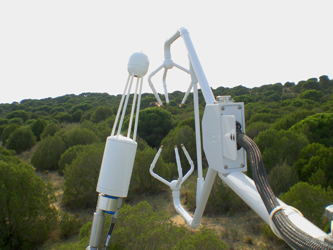The long-term ecological research has managed to arouse the interest of the scientific community working in ecology, not only by the publication of its findings but also by the collaborative and transdisciplinary nature of its activities. Focusing on the Spanish case, since the creation of the LTER-Spain network in 2008, the different nodes, all of them protected areas, have consolidated this approach implementing long-term environmental programs. The monograph published in Ecosystems shows the progress in the implementation of long-term ecological research in sites that are part of the Spanish network, and a specific case in southern Argentina. A total of seven works are presented, five of them reviewing the growing scientific contribution arising from this approach in three National Parks: Tablas de Daimiel, Doñana and Ordesa and Monte Perdido; Monitoring Network on Global Change in National Parks and one in Argentina.
Doñana, as a whole, has definitely helped to consolidate ecological monitoring and long-term research in Spain. An integrated approach, combining the efforts of managers and researchers has led to scientific contributions improving the understanding of Doñana's biodiversity and ecosystem functioning. This paper (http://www.revistaecosistemas.net/index.php/ecosistemas/article/view/1093) reviews the scientific contributions and management improvements provided by the implementation of a long-term ecological monitoring program and the LTER networking activities. Especially, the paper reviews the contribution of landscape-scale monitoring by remote sensing s.l., with its retrospective and multi-scale analysis capacity; the different monitoring protocols of local populations of primary consumers and their role in the Doñana ecosystems; the great effort made to incorporate automatic monitoring by deploying sensors and developments adapted to harsh field conditions; the contributions of the socio-ecological approach to assess the state of conservation and environmental services of the Doñana LTSER platform; and finally, the perspective from the management of the program's usefulness when it comes to decision making and the incorporation in international networks LTER. In summary, this review aims to show the different benefits achieved by the implementation of a long-term (socio-)ecological monitoring and research program in Doñana.
informacion[at]ebd.csic.es: Díaz-Delgado et al (2016). Contribución del seguimiento ecológico a largo plazo a la investigación y la gestión en la plataforma LTSER-Doñana. Ecosistemas 25(1): 09-18. Doi.: 10.7818/ECOS.2016.25-1.03 http://www.revistaecosistemas.net/index.php/ecosistemas/article/view/1093;
Díaz-Delgado, R. 2016. La investigación y seguimiento ecológico a largo plazo (LTER). Ecosistemas 25(1): 01-03. Doi.: 10.7818/ECOS.2016.25-1.01 http://www.revistaecosistemas.net/index.php/ecosistemas/article/view/1188


 Las altas temperaturas están provocando que las lagunas y las marismas de Doñana pierdan agua rápidamente
Las altas temperaturas están provocando que las lagunas y las marismas de Doñana pierdan agua rápidamente




